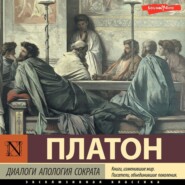По всем вопросам обращайтесь на: info@litportal.ru
(©) 2003-2024.
✖
Phaedo
Настройки чтения
Размер шрифта
Высота строк
Поля
And what is that?
Death.
Then the soul, as has been acknowledged, will never receive the opposite of what she brings.
Impossible, replied Cebes.
And now, he said, what did we just now call that principle which repels the even?
The odd.
And that principle which repels the musical, or the just?
The unmusical, he said, and the unjust.
And what do we call the principle which does not admit of death?
The immortal, he said.
And does the soul admit of death?
No.
Then the soul is immortal?
Yes, he said.
And may we say that this has been proven?
Yes, abundantly proven, Socrates, he replied.
Supposing that the odd were imperishable, must not three be imperishable?
Of course.
And if that which is cold were imperishable, when the warm principle came attacking the snow, must not the snow have retired whole and unmelted – for it could never have perished, nor could it have remained and admitted the heat?
True, he said.
Again, if the uncooling or warm principle were imperishable, the fire when assailed by cold would not have perished or have been extinguished, but would have gone away unaffected?
Certainly, he said.
And the same may be said of the immortal: if the immortal is also imperishable, the soul when attacked by death cannot perish; for the preceding argument shows that the soul will not admit of death, or ever be dead, any more than three or the odd number will admit of the even, or fire or the heat in the fire, of the cold. Yet a person may say: 'But although the odd will not become even at the approach of the even, why may not the odd perish and the even take the place of the odd?' Now to him who makes this objection, we cannot answer that the odd principle is imperishable; for this has not been acknowledged, but if this had been acknowledged, there would have been no difficulty in contending that at the approach of the even the odd principle and the number three took their departure; and the same argument would have held good of fire and heat and any other thing.
Very true.
And the same may be said of the immortal: if the immortal is also imperishable, then the soul will be imperishable as well as immortal; but if not, some other proof of her imperishableness will have to be given.
No other proof is needed, he said; for if the immortal, being eternal, is liable to perish, then nothing is imperishable.
Yes, replied Socrates, and yet all men will agree that God, and the essential form of life, and the immortal in general, will never perish.
Yes, all men, he said – that is true; and what is more, gods, if I am not mistaken, as well as men.
Seeing then that the immortal is indestructible, must not the soul, if she is immortal, be also imperishable?
Most certainly.
Then when death attacks a man, the mortal portion of him may be supposed to die, but the immortal retires at the approach of death and is preserved safe and sound?
True.
Then, Cebes, beyond question, the soul is immortal and imperishable, and our souls will truly exist in another world!
I am convinced, Socrates, said Cebes, and have nothing more to object; but if my friend Simmias, or any one else, has any further objection to make, he had better speak out, and not keep silence, since I do not know to what other season he can defer the discussion, if there is anything which he wants to say or to have said.
But I have nothing more to say, replied Simmias; nor can I see any reason for doubt after what has been said. But I still feel and cannot help feeling uncertain in my own mind, when I think of the greatness of the subject and the feebleness of man.
Yes, Simmias, replied Socrates, that is well said: and I may add that first principles, even if they appear certain, should be carefully considered; and when they are satisfactorily ascertained, then, with a sort of hesitating confidence in human reason, you may, I think, follow the course of the argument; and if that be plain and clear, there will be no need for any further enquiry.
Very true.
But then, O my friends, he said, if the soul is really immortal, what care should be taken of her, not only in respect of the portion of time which is called life, but of eternity! And the danger of neglecting her from this point of view does indeed appear to be awful. If death had only been the end of all, the wicked would have had a good bargain in dying, for they would have been happily quit not only of their body, but of their own evil together with their souls. But now, inasmuch as the soul is manifestly immortal, there is no release or salvation from evil except the attainment of the highest virtue and wisdom. For the soul when on her progress to the world below takes nothing with her but nurture and education; and these are said greatly to benefit or greatly to injure the departed, at the very beginning of his journey thither.
For after death, as they say, the genius of each individual, to whom he belonged in life, leads him to a certain place in which the dead are gathered together, whence after judgment has been given they pass into the world below, following the guide, who is appointed to conduct them from this world to the other: and when they have there received their due and remained their time, another guide brings them back again after many revolutions of ages. Now this way to the other world is not, as Aeschylus says in the Telephus, a single and straight path – if that were so no guide would be needed, for no one could miss it; but there are many partings of the road, and windings, as I infer from the rites and sacrifices which are offered to the gods below in places where three ways meet on earth. The wise and orderly soul follows in the straight path and is conscious of her surroundings; but the soul which desires the body, and which, as I was relating before, has long been fluttering about the lifeless frame and the world of sight, is after many struggles and many sufferings hardly and with violence carried away by her attendant genius, and when she arrives at the place where the other souls are gathered, if she be impure and have done impure deeds, whether foul murders or other crimes which are the brothers of these, and the works of brothers in crime – from that soul every one flees and turns away; no one will be her companion, no one her guide, but alone she wanders in extremity of evil until certain times are fulfilled, and when they are fulfilled, she is borne irresistibly to her own fitting habitation; as every pure and just soul which has passed through life in the company and under the guidance of the gods has also her own proper home.
Now the earth has divers wonderful regions, and is indeed in nature and extent very unlike the notions of geographers, as I believe on the authority of one who shall be nameless.
What do you mean, Socrates? said Simmias. I have myself heard many descriptions of the earth, but I do not know, and I should very much like to know, in which of these you put faith.
And I, Simmias, replied Socrates, if I had the art of Glaucus would tell you; although I know not that the art of Glaucus could prove the truth of my tale, which I myself should never be able to prove, and even if I could, I fear, Simmias, that my life would come to an end before the argument was completed. I may describe to you, however, the form and regions of the earth according to my conception of them.
That, said Simmias, will be enough.
Well, then, he said, my conviction is, that the earth is a round body in the centre of the heavens, and therefore has no need of air or any similar force to be a support, but is kept there and hindered from falling or inclining any way by the equability of the surrounding heaven and by her own equipoise. For that which, being in equipoise, is in the centre of that which is equably diffused, will not incline any way in any degree, but will always remain in the same state and not deviate. And this is my first notion.
Which is surely a correct one, said Simmias.
Also I believe that the earth is very vast, and that we who dwell in the region extending from the river Phasis to the Pillars of Heracles inhabit a small portion only about the sea, like ants or frogs about a marsh, and that there are other inhabitants of many other like places; for everywhere on the face of the earth there are hollows of various forms and sizes, into which the water and the mist and the lower air collect. But the true earth is pure and situated in the pure heaven – there are the stars also; and it is the heaven which is commonly spoken of by us as the ether, and of which our own earth is the sediment gathering in the hollows beneath. But we who live in these hollows are deceived into the notion that we are dwelling above on the surface of the earth; which is just as if a creature who was at the bottom of the sea were to fancy that he was on the surface of the water, and that the sea was the heaven through which he saw the sun and the other stars, he having never come to the surface by reason of his feebleness and sluggishness, and having never lifted up his head and seen, nor ever heard from one who had seen, how much purer and fairer the world above is than his own. And such is exactly our case: for we are dwelling in a hollow of the earth, and fancy that we are on the surface; and the air we call the heaven, in which we imagine that the stars move. But the fact is, that owing to our feebleness and sluggishness we are prevented from reaching the surface of the air: for if any man could arrive at the exterior limit, or take the wings of a bird and come to the top, then like a fish who puts his head out of the water and sees this world, he would see a world beyond; and, if the nature of man could sustain the sight, he would acknowledge that this other world was the place of the true heaven and the true light and the true earth. For our earth, and the stones, and the entire region which surrounds us, are spoilt and corroded, as in the sea all things are corroded by the brine, neither is there any noble or perfect growth, but caverns only, and sand, and an endless slough of mud: and even the shore is not to be compared to the fairer sights of this world. And still less is this our world to be compared with the other. Of that upper earth which is under the heaven, I can tell you a charming tale, Simmias, which is well worth hearing.
And we, Socrates, replied Simmias, shall be charmed to listen to you.
The tale, my friend, he said, is as follows: – In the first place, the earth, when looked at from above, is in appearance streaked like one of those balls which have leather coverings in twelve pieces, and is decked with various colours, of which the colours used by painters on earth are in a manner samples. But there the whole earth is made up of them, and they are brighter far and clearer than ours; there is a purple of wonderful lustre, also the radiance of gold, and the white which is in the earth is whiter than any chalk or snow. Of these and other colours the earth is made up, and they are more in number and fairer than the eye of man has ever seen; the very hollows (of which I was speaking) filled with air and water have a colour of their own, and are seen like light gleaming amid the diversity of the other colours, so that the whole presents a single and continuous appearance of variety in unity. And in this fair region everything that grows – trees, and flowers, and fruits – are in a like degree fairer than any here; and there are hills, having stones in them in a like degree smoother, and more transparent, and fairer in colour than our highly-valued emeralds and sardonyxes and jaspers, and other gems, which are but minute fragments of them: for there all the stones are like our precious stones, and fairer still (compare Republic). The reason is, that they are pure, and not, like our precious stones, infected or corroded by the corrupt briny elements which coagulate among us, and which breed foulness and disease both in earth and stones, as well as in animals and plants. They are the jewels of the upper earth, which also shines with gold and silver and the like, and they are set in the light of day and are large and abundant and in all places, making the earth a sight to gladden the beholder's eye. And there are animals and men, some in a middle region, others dwelling about the air as we dwell about the sea; others in islands which the air flows round, near the continent: and in a word, the air is used by them as the water and the sea are by us, and the ether is to them what the air is to us. Moreover, the temperament of their seasons is such that they have no disease, and live much longer than we do, and have sight and hearing and smell, and all the other senses, in far greater perfection, in the same proportion that air is purer than water or the ether than air. Also they have temples and sacred places in which the gods really dwell, and they hear their voices and receive their answers, and are conscious of them and hold converse with them, and they see the sun, moon, and stars as they truly are, and their other blessedness is of a piece with this.
Such is the nature of the whole earth, and of the things which are around the earth; and there are divers regions in the hollows on the face of the globe everywhere, some of them deeper and more extended than that which we inhabit, others deeper but with a narrower opening than ours, and some are shallower and also wider. All have numerous perforations, and there are passages broad and narrow in the interior of the earth, connecting them with one another; and there flows out of and into them, as into basins, a vast tide of water, and huge subterranean streams of perennial rivers, and springs hot and cold, and a great fire, and great rivers of fire, and streams of liquid mud, thin or thick (like the rivers of mud in Sicily, and the lava streams which follow them), and the regions about which they happen to flow are filled up with them. And there is a swinging or see-saw in the interior of the earth which moves all this up and down, and is due to the following cause: – There is a chasm which is the vastest of them all, and pierces right through the whole earth; this is that chasm which Homer describes in the words, —
'Far off, where is the inmost depth beneath the earth;'

















